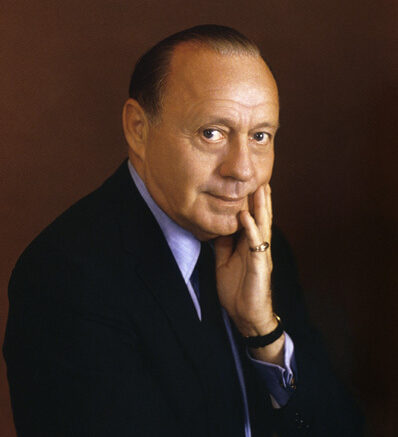Jack Benny was born Benjamin Kubelsky on Feb. 14, 1894 in Chicago and grew up in nearby Waukegan. His father was from Poland, and his mother was from Lithuania. His career spanned 63 years until his death in 1974 at the age of 80.
He was given his first violin at age 6 and his mother wanted very much that he become a classical violinist. But he hated to practice and stopped practicing when he was 12. He didn’t care for school either, and was thrown out of high school during his freshman year.
When he was 17 he began playing violin in local vaudeville theatres playing 4-5 shows a day which was interrupted at age 23 when he joined the navy during WW I playing for the troops.
In 1927 he married Sadie Marks, whose name became Mary Livingstone Benny. Mary thought Jack would be perfect for radio and urged him to try the new medium. Jack, was working on Broadway, and wasn’t interested in radio. In fact he considered it to be just a fad that would blow over! Then in 1932 Ed Sullivan invited him to appear on his radio show, and Benny soon had his own radio show which lasted 33 years! His sponsors were Canada Dry Ginger Ale, Chevrolet, General Tire, and General Foods, for whom he advertised Jello-O and Grape Nuts. And later, American Tobacco’s Lucky Strike cigarettes.
In 1934 The Benny’s adopted 2 week old Joan Benny, who eventually had four children of her own.
Jack Benny’s very best friend was George Burns, whom he had known since his vaudeville days. In skits with Burns, Benny did an incredible impersonation of Gracie Allen.
During WW II Benny made countless appearances for war bond drives and traveled around the world entertaining troops. He always did more at each show than had been planned and spent hours talking to the military personnel one on one and visited the wounded in hospitals. He’d walk from bed to bed, talking with each patient, and carefully jot down each person’s family’s contact information. When he returned home he very meticulously went through his notebooks and wrote or called each family. After his death his wife found thousands of thank you letters from military personnel and their relatives. He wrote: “I’m prouder of this service than of all the other successes in my career.”
A few months after Germany surrendered in 1945, Jack went to occupied Germany entertaining the GIs, and performed a big show for more than 40,000 soldiers in Nuremberg, at the stadium where Hitler made his initial speech about Nazism from a platform at the top of the stadium. After the show, Jack had to urinate, and the director, Billy Wilder took him up to that very platform to relieve himself there.
The violin was Benny’s great love and he regretted having stopped practicing at age 12. In 1944 Benny first appeared with a symphony orchestra, the L.A. Philharmonic at the Hollywood Bowl in a benefit concert for Greek War Relief. It wasn’t long before he decided to return to the serious study of the violin. He hired a teacher, took two lessons a week and began practicing 2-4 hours every day. His wife couldn’t stand it, so Benny used his bathroom as his practice room.
No matter how angry or disturbed he might be, whenever he played the violin, he forgot about his anxieties and completely relaxed. Heifetz told him that he had an excellent tone and a good bow arm. Benny wrote: “The humor of my concerts arises not from my making fun of music, but from the fact that I am really trying, struggling, fighting to play the violin and I can’t quite make it. I started too late in life.” He sometimes performed skits with Mel Blanc playing the role of Benny’s violin teacher, and with Liberace and other famous artists.
Benny never charged a fee for his solo appearances with almost 100 symphony orchestras in the U.S., Canada, England and Israel. They were benefit concerts for the orchestras, and he also raised money for The Cedars of Lebanon Hospital, the City of Hope Hospital, Carnegie Hall, the conservatory of music at the Univ. of Hartford, CT, the music center in Lake County, IL, and the Mann Auditorium in Israel. His benefit concerts raised $5,901,000 dollars!
Benny was the head writer and director of his programs, although he was not credited in either capacity. He had tremendous regard for his writers, always giving them credit for much of the success of his shows, paying them well, and always treating them with courtesy and respect.
He worked very hard to make what he did seem casual and spontaneous. Jack, his secretary, and his writers worked meticulously on every script. Benny thought of comedy as a business and worked at it unendingly. He was enormously concerned line by line with whatever he did. He polished and re-polished every sentence.
Benny allowed his supporting characters to draw laughs at the expense of his own flaws. He said: “I don’t care who gets the laughs on my show as long as its funny.” As Johnny Carson said: “I learned a very important thing from Jack. If other people on your show are good, it makes you better. The stronger the other performers are, the greater it is for the whole program. And he was the most disciplined performer I ever met.
“He was completely unaffected. Whenever we’d walk down the street together in New York or L.A. and he was stopped, Jack always talked with people if they said hello to him. Overall, Jack seemed to be a very secure man. I know of only one area in which he had insecurities. Jack felt that he was not sufficiently well read. He regretted his lack of formal education.” Benny’s life was so filled with show business that he had neither the energy nor the desire to pursue other interests. He was not a member of any political party.
He liked to keep slim. He had a personal trainer with whom he jogged several miles every morning, and when he got older, they would do a half hour of calisthenics daily. He walked for miles at a brisk pace, and when he played golf he would hire a caddie and a golf cart, and then walk the 18 holes and let the caddie ride!
Eddie Anderson played Benny’s valet and chauffeur, Rochester, a character who often got the better of his vain boss. In his later years Benny wrote: “Today I would never have any character who was as racially delineated along negative lines as was the old Rochester. I developed and learned my trade in vaudeville. Everybody loved ethnic humor during vaudeville. During WW II, attitudes changed. Hitler’s ideology of Aryan supremacy put all ethnic humor in a bad light. It became bad taste to have Jewish jokes, Italian jokes and Negro jokes. When the black man’s fight for equal rights and fair play became an issue after the war, I would no longer allow Rochester to say or do anything that an audience would consider degrading to the dignity of a modern Afro-American.”
His manager Irving Fein wrote: “He was a very generous man, He would contribute 25K to the United Jewish Appeal or 25K to the L.A. Music Center without blinking an eye. He donated to the symphony fund, the art museum and scores of other charities. He would think very little of giving $1,000 or $5,000 for any good cause.
He greatly encouraged and helped the budding careers of many entertainers, among them, Danny Kaye, Johnny Carson, Jack Paar, and Wayne Newton.
George Burns said: “All his adult life, Jack used to write at least 50 postcards a week to people.” One of his producer-directors said: “He didn’t act like any other celebrity I’ve ever known. He appreciated things more than others. He was always more surprised. He was happier at someone else’s success. He managed to retain a kind of boyish, naïve enthusiasm and a special joy for day-by-day living.”
He was very grateful to his wife, Mary. He said to a friend: “If it wasn’t for her, I’d be a 3rd rate violinist in some little dump. She had the brains, the courage, and the ambition to push me forward. She’s responsible for my success.”
One of Benny’s producers said: “To me, Jack was a brooding man, a very lonely man in some ways.” Veronica Peck, Gregory Peck’s wife said: “Once he told me quite seriously how much he regretted being such a moody man, because Mary was the one who had to live with him and his moods. I don’t think people who are capable of creating greatness, who are able to reach such high artistic heights, could achieve what they do without the other side of their nature for balance.” His business manager, Myrt Blum said: “Jack gets highs that are much higher than most when he’s exuberant and exhilarated. They can last for days and sometimes weeks. But when he hits a low, and it might be for no reason we know of, he is impossible to talk to.” Jack told Irving Fein, that he had been that way all his life. Fein wrote:“Although he was a mild mannered man on the surface, always the pessimist, quite often Jack would explode. When he would become incensed, it was the anger of a person accustomed to keeping the plug over boiling water. When the plug was pulled, watch out! He was frequently insensitive to the feelings of people around him without realizing it. His lack of delicacy of feeling was unintentional.”
His granddaughter Maria recalled: “Everything he did was concentrated on his work. He never thought of money, or material possessions.” Even after becoming a living legend in the business, he never rested on his laurels; he was continuously preoccupied about his performance. Gregory Peck said: “For Jack, comedy was an art. He did it seemingly without effort. Yet behind the scenes, it took years and years of constant work until he refined his art to the point where he could do more with less than anyone in the business.”
In 1959 his hometown of Waukegan constructed the Jack Benny Junior High School. Benny attended the dedication ceremonies and called it the proudest moment of his life.
Towards the end of his life, Benny was very uncomfortable about turning 80. He was frequently nervous, unhappy and experienced stomach pains. Amazingly, his violin playing would alleviate the pain! In 1974 at age 80 Benny died peacefully, while in a coma, from cancer of the pancreas and was never told he had it. His Stradavarius violin was left to the L.A. Philharmonic.
Jack and Mary were married for 48 years. After his death, Mary began to receive a delivery of one long-stemmed red rose every day. When she asked the florist who was sending these roses every day, he told her that one day, Jack had been in the shop and said: “If anything should ever happen to me, I want you to send my doll a red rose every day.” Mary then learned that Jack had included a provision for this in his will. One red rose was to be delivered to her every day…for the rest of her life.

